
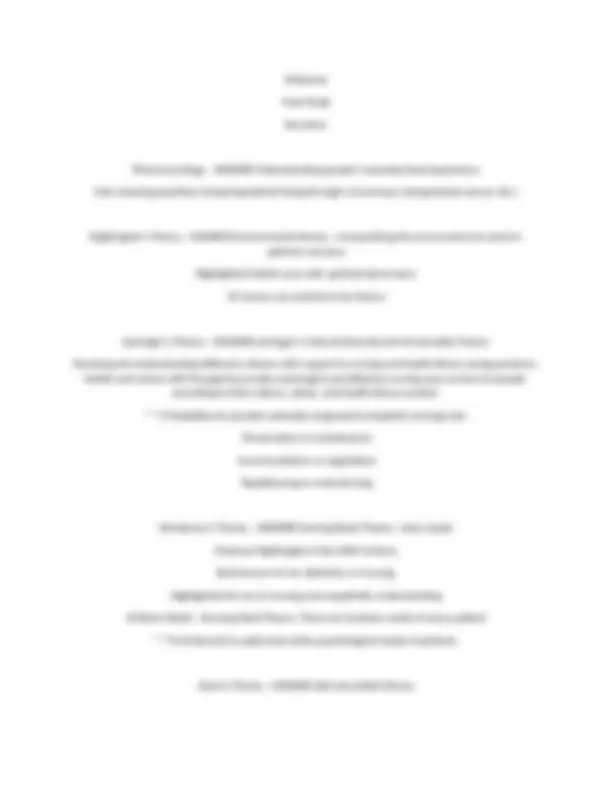
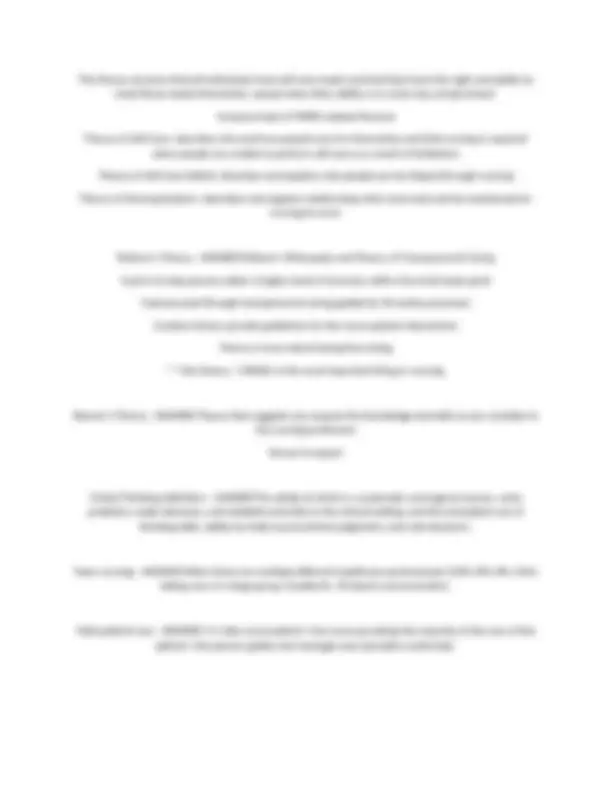
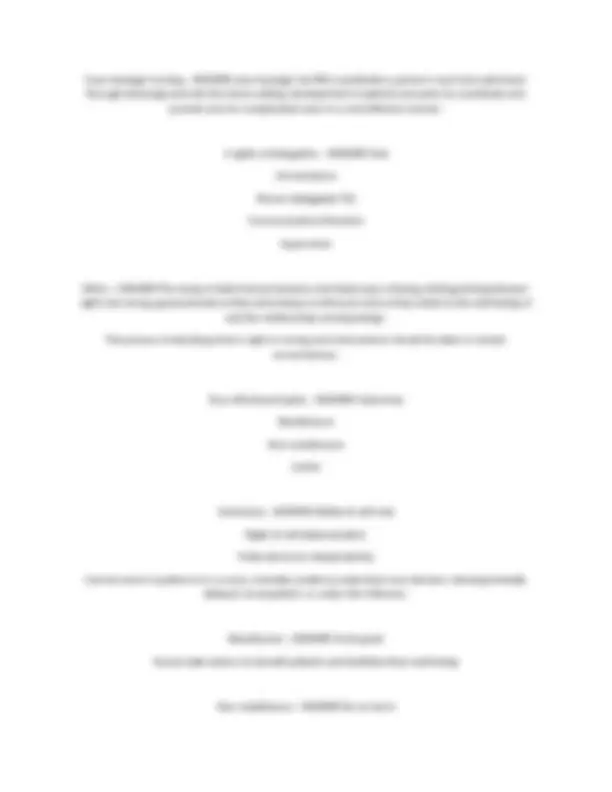
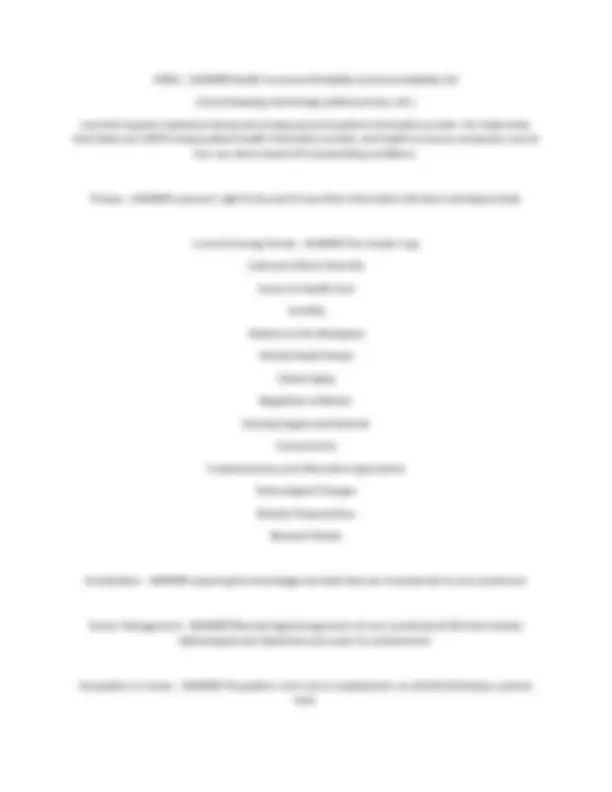
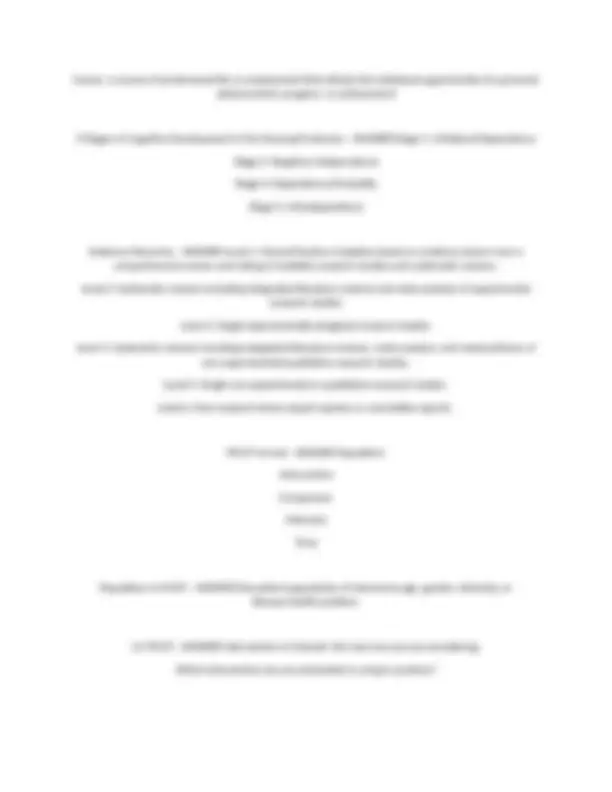
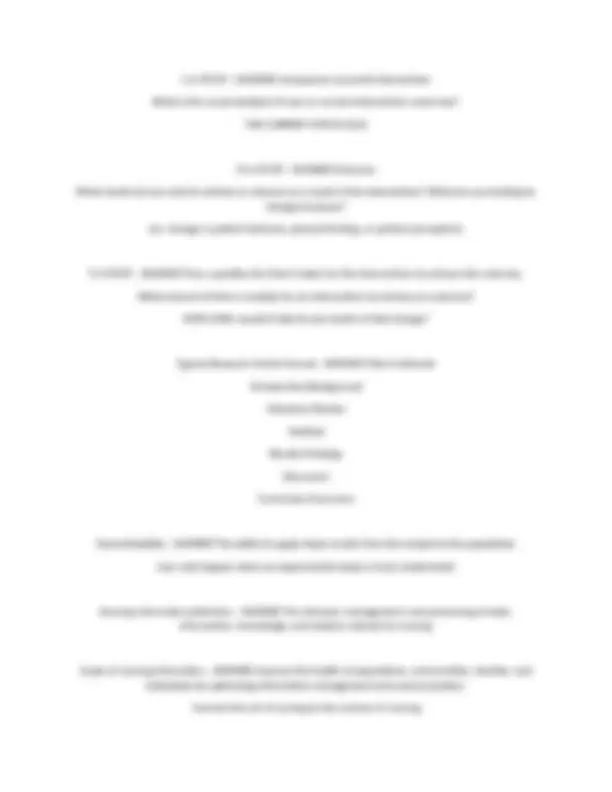
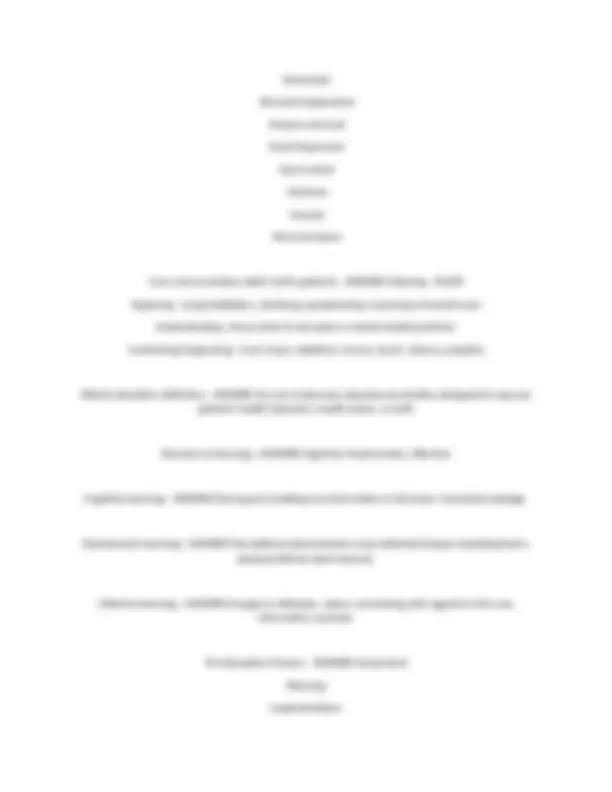
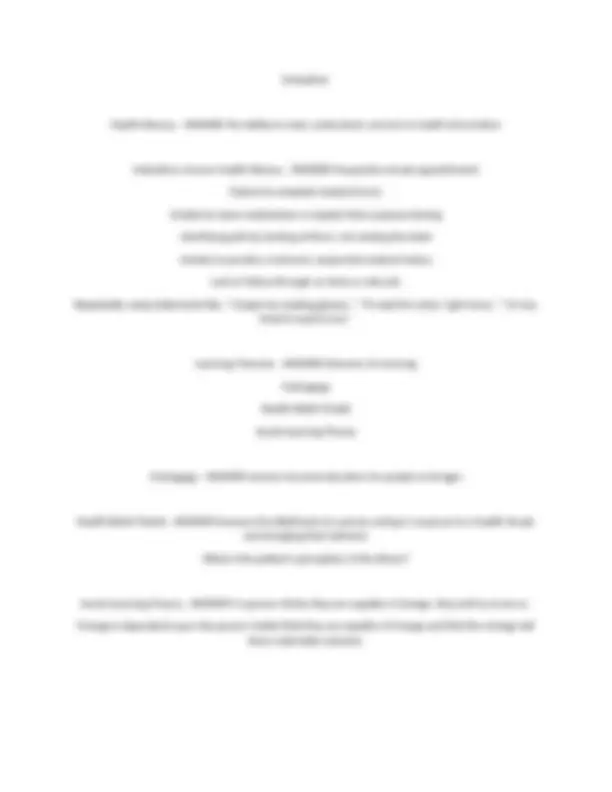


Study with the several resources on Docsity

Earn points by helping other students or get them with a premium plan


Prepare for your exams
Study with the several resources on Docsity

Earn points to download
Earn points by helping other students or get them with a premium plan
Community
Ask the community for help and clear up your study doubts
Discover the best universities in your country according to Docsity users
Free resources
Download our free guides on studying techniques, anxiety management strategies, and thesis advice from Docsity tutors
Various nursing theories, concepts, and practices. It provides definitions and explanations of key nursing roles, evidence-based practice, quality improvement, qualitative research methods, and prominent nursing theorists such as nightingale, leininger, and watson. It also discusses important ethical principles in nursing, current nursing trends, communication strategies, patient education, and learning theories. The comprehensive coverage of nursing theory and its application to clinical practice makes this document a valuable resource for nursing students and professionals.
Typology: Exams
1 / 14

This page cannot be seen from the preview
Don't miss anything!









Definition of nursing - ANSWER "The unique function of the nurse is to assist the individual, sick or well, in the performance of those activities contributing to health or its recovery (or to a peaceful death) that he would perform unaided if he had the necessary strength, will or knowledge." Roles of the nurse - ANSWER Caregiver Communicator Collaborator Educator Manager Leader Advocate Researcher & Innovator Evidence Based Practice - ANSWER clinical decision making that integrates the best available research with clinical expertise and patient characteristics and preferences Quality Improvement - ANSWER focuses on improvement of health care-related processes, systems, satisfactions, and cost outcomes. The Research Process - ANSWER Conceptualize the problem Design the study Implement the design Analyze/Interpret the data Use the results
Independant variable - ANSWER the variable that is manipulated; presumed cause Dependent variable - ANSWER the outcome variable that is being measured; relies on the independent variable Key concepts of quantitative research - ANSWER control, randomization, manipulation, Hypothesis - ANSWER A testable prediction of the link between two variables. 2 types of statistical tests - ANSWER descriptive and inferential Descriptive statistics - ANSWER Brief, descriptive numbers that summarize a sample of data. (measures of central tendency, standard deviation, variability) Inferential statistics - ANSWER Used to make inferences ABOUT THE POPULATION based on sample data; make inferences about the hypotheses and interpret the findings. Statistical significance - ANSWER P < 0.05 to be statistically significant! (means STRONG relationship between the two variables, so we reject the null hypothesis) Key concepts of qualitative research - ANSWER investigate phenomena, words, NOT stats/numbers, flexible (we can go where the research takes us), data collection and analysis happen at the same time Qualitative research data collection methods - ANSWER interviews, observations, focus groups, questionnaires, field notes, participant journals & diaries, photo elicitation Types of qualitative research - ANSWER Phenomenology Ethnography Grounded Theory
This theory assumes that all individuals have self-care needs and that they have the right and ability to meet these needs themselves, except when their ability is in some way compromised. Compromised of THREE related theories Theory of Self-Care: describes why and how people care for themselves and that nursing is required when people are unable to perform self-care as a result of limitations Theory of Self-Care Deficit: describes and explains why people can be helped through nursing Theory of Nursing Systems: describes and explains relationships that must exist and be maintained for nursing to occur Watson's Theory - ANSWER Watson's Philosophy and Theory of Transpersonal Caring Goal is to help persons attain a higher level of harmony within the mind-body-spirit Goal pursued through transpersonal caring guided by 10 caritas processes Carative factors provide guidelines for the nurse-patient interactions Theory is more about being than doing ***Her theory - CARING is the most important thing in nursing. Benner's Theory - ANSWER Theory that suggests you acquire the knowledge and skills as you socialize to the nursing profession Novice to expert Critical Thinking definition - ANSWER The ability to think in a systematic and logical manner, solve problems, make decisions, and establish priorities in the clinical setting, and the competent use of thinking skills, ability to make sound clinical judgments, and safe decisions. Team nursing - ANSWER When there are multiple different healthcare professionals (CNP, LPN, RN, CNA) taking care of a large group of patients. All about communication. Total patient care - ANSWER 1:1 ratio nurse:patient. One nurse providing the majority of the care of the patient. One person guides and manages care (provides continuity).
Case manager nursing - ANSWER case manager (an RN) coordinates a person's care from admission through discharge and into the home setting; development of patient care plans to coordinate and provide care for complicated cases in a cost-effective manner. 5 rights of delegation - ANSWER Task Circumstance Person (delegated TO) Communication/Direction Supervision Ethics - ANSWER The study of ideal human behavior and ideal ways of being; distinguishing between right and wrong, good and bad as they exist along a continuum and as they relate to the well-being of and the relationships among beings. The process of deciding what is right or wrong and what actions should be taken in certain circumstances. Four ethical principles - ANSWER Autonomy Beneficence Non-maleficence Justice Autonomy - ANSWER Ability to self-rule Right of self-determination Make decisions independently Cannot work if a patient is in a coma, mentally unable to make their own decision, developmentally delayed, incompetent, or under the influence. Beneficence - ANSWER To do good Nurses take actions to benefit patients and facilitate their well-being Non-maleficence - ANSWER Do no harm
Quality enhancement strategies (data collection, coding & analysis, presentation) - ANSWER Data collection: prolonged engagement and observation, data and method triangulation, audit trails (explain how and when researchers gathered data), member checking Coding and analysis: investigator triangulation, peer review & debriefing, inquiry audits (expert in field critiques your data to make sure it is accurate) Presentation: researcher credibility, thick and contextualized description (direct quotes from participants!) Grounded Theory - ANSWER Asks process questions to create a theory Start with phenomenon, gather info, interview experts, create theory about phenomenon. Data Saturation - ANSWER Sampling until no new information is obtained and redundancy is achieved Nursing theory definition - ANSWER A set of related ideas/concepts to help find meaning of a phenomenon; a framework for our practice. Nursing theory separates you from other educated practicing nurses. Nursing theory associated terms - ANSWER Concepts - words or phrases used to create boundaries or structure for phenomenon Assumptions - relationships between two items. Kinda like a hypothesis for the links between the concepts Propositions - your definitive statement that describes the statement between those two items Malpractice - ANSWER The failure of a professional to use such care as a reasonably prudent member of the profession would use under similar circumstances that leads to harm. Informed consent - ANSWER The legal obligation of a provider to disclose necessary information at a level that the person can understand so they can make an informed decision. Standards of care - ANSWER the legal requirements for nursing practice that describe minimum acceptable nursing care.
HIPAA - ANSWER Health Insurance Portability and Accountability Act (record keeping, technology, patient privacy, etc.) Law that requires medical professionals to keep personal patient information private. Our federal law that states you HAVE to keep patient health information private, and health insurance companies cannot turn you down based off of preexisting conditions. Privacy - ANSWER a person's right to be and to have their information left alone and kept private Current Nursing Trends - ANSWER The Gender Gap Cultural & Ethnic Diversity Access to Health Care Incivility Violence in the Workplace Mental Health Needs Global Aging Regulation & Reform Nursing Supply and Demand Consumerism Complementary and Alternative Approaches Technological Changes Disaster Preparedness Research Needs Socialization - ANSWER acquiring the knowledge and skills that are characteristic to your profession Career Management - ANSWER Planned logical progression of one's professional life that includes defined goals and objectives and a plan for achievement. Occupation vs Career - ANSWER Occupation: one's job or employment; an activity that keeps a person busy.
C in PICOT - ANSWER Comparison (current) intervention What is the usual standard of care or current intervention used now? THE CURRENT STATUS QUO O in PICOT - ANSWER Outcome What results do you wish to achieve or observe as a result of the intervention? What are you looking to change/measure? (ex. change in patient behavior, physical finding, or patient perception) T in PICOT - ANSWER Time: specifies the time it takes for the intervention to achieve the outcome. What amount of time is needed for an intervention to achieve an outcome? HOW LONG would it take to see results of that change? Typical Research Article Format - ANSWER Title & Abstract Introduction/Background Literature Review Method Results/Findings Discussion Conclusion/Summary Generalizability - ANSWER The ability to apply study results from the sample to the population (can only happen when an experimental study is truly randomized) Nursing Informatics definition - ANSWER The retrieval, management, and processing of data, information, knowledge, and wisdom relevant to nursing Goals of nursing informatics - ANSWER Improve the health of populations, communities, families, and individuals by optimizing information management and communication. Connect the art of nursing to the science of nursing
Support information management across all nursing specialties Evaluating resources/nursing informatics - ANSWER Is it a reliable source? Is the information on that website correct? Healthcare Collaboration definition - ANSWER Implies working jointly with other professionals, all of whom are respected for their unique knowledge and abilities, to improve a patient's health status or to solve an organizational problem. Goals of collaboration - ANSWER Achieve high-quality patient care and satisfaction Prevent redundancies, deficits, and errors Enhance continuity across the continuum of care Provide research-based, high-quality, cost-effective care that is driven by expected outcomes Promote mutual respect and communication among nurse, patient, and caregiver Provide opportunities to solve issues and problems Provide a full-range of expertise through each of the team members Communication (definition) - ANSWER An interaction between two or more persons that involves the exchange of information between a sender and a receiver. It involves the expression of emotions, ideas, and thoughts through verbal and non-verbal signals. Facilitating factors of communication - ANSWER Listen carefully and reflect back a summary of the patient's concerns Use terms and vocabulary appropriate for the patient Call the patient by his or her preferred name Use respectful and professional language Ask the patient what he or she needs and responds promptly Provide helpful information Solicit feedback from the patient Employ humor as appropriate
Nonverbal -Personal Appearance -Posture and Gait -Facial Expression -Eye Contact -Gestures -Sounds -Personal Space Core communication skills! (with patients) - ANSWER Listening - SOLER Exploring - using facilitators, clarifying, paraphrasing, assessing nonverbal cues Understanding - know when to ask open or closed ended questions Comforting/Supporting - trust, hope, validation, humor, touch, silence, empathy Patient education definition - ANSWER Any set of planned, educational activities designed to improve patients' health behaviors, health status, or both Domains of learning - ANSWER Cognitive, Psychomotor, Affective Cognitive learning - ANSWER Storing and recalling new information in the brain. Factual knowledge. Psychomotor learning - ANSWER The ability to demonstrate a new skills/techniques indicating that a physical skill has been learned. Affective learning - ANSWER Changes in attitudes, values, and feeling with regards to the new information received. The Education Process - ANSWER Assessment Planning Implementation
Evaluation Health literacy - ANSWER The ability to read, understand, and act on health information Indications of poor health literacy - ANSWER Frequently missed appointments Failure to complete medical forms Unable to name medications or explain their purpose/dosing Identifying pills by looking at them, not reading the label Unable to provide a coherent, sequential medical history Lack of follow-through on tests or referrals Repeatedly using statements like, "I forgot my reading glasses," "I'll read this when I get home," "I'm too tired to read it now." Learning Theories - ANSWER Domains of Learning Andragogy Health Belief Model Social Learning Theory Andragogy - ANSWER Learner-focused education for people of all ages Health Belief Model - ANSWER Assesses the likelihood of a person acting in response to a health threat and changing their behavior What is the patient's perception of the illness? Social Learning Theory - ANSWER If a person thinks they are capable of change, they will try to do so. Change is dependent upon the person's belief that they are capable of change and that the change will have a desirable outcome.